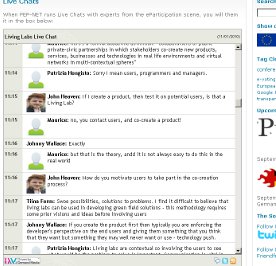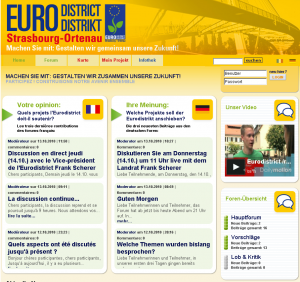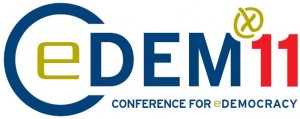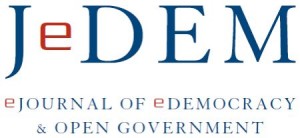Archive for the ‘Projects’ Category
 |
17. November 2010 – 16:42 by Bengt Feil (TuTech Innovation GmbH)
|
 Climate change is a reality and there is a significant increase of natural disasters as a result. Whether you look at Pakistan or Brandenburg news of floods or broken dikes is reaching us with alarming frequency. The metropolitan area of Hamburg in Germany has to prepare itself to be hit by these kinds of disasters like any other major city close to the sea. There is a need to develop sustainable measures to cope with the danger posed by climate change in the next decades.
Climate change is a reality and there is a significant increase of natural disasters as a result. Whether you look at Pakistan or Brandenburg news of floods or broken dikes is reaching us with alarming frequency. The metropolitan area of Hamburg in Germany has to prepare itself to be hit by these kinds of disasters like any other major city close to the sea. There is a need to develop sustainable measures to cope with the danger posed by climate change in the next decades.
On November 15th the online discourse “Floods in Hamburg – What reaction is necessary” was launched to discuss the dangers and potential measures against more frequent flood incidents. Citizens and experts are invited to visit hochwasser-nord.de and post their ideas and comments on how the city should be prepared for the future. Furthermore the website offers in-depth information on the possibilities to protect against floods and to adapt to them developed by companies and scientists.
The discussion will run for three weeks and has been initialized by the research project KLIMZUG-NORD, which has been mentioned on PEP-NET before. The project tries to develop a strategy to adapt large metropolitan area, like Hamburg, to the effects of climate change.
The results of the online discourse will provide important hints at what measures are acceptable to the public and will be integrated into the adaption strategy.
Posted in Projects | No Comments »
 |
16. November 2010 – 12:00 by John Heaven (TuTech Innovation GmbH)
|

Birmingham's Virtual Library. Click for larger image
It’s easy to reject Second Life as an eParticipation platform, but Birmingham City Council is just about to launch a virtual model of the planned £193m Library of Birmingham. I spoke to representatives of the Council and the company that they are working with to find out what they are doing, and how they are making the virtual library accessible to a wide audience. What I found was fascinating, and I really think Second Life deserves a second look.
Second Life is a virtual world that allows users to assume a second identity and explore a digital three-dimensional world. It’s not difficult to see how this could be used to enable people to “go” to places they wouldn’t otherwise visit, network with people from far away, or take part in virtual events. That’s the theory; but my big issue with Second Life is that it is a very niche audience and it takes quite a lot of effort to download the software and work out how to use it. Once you’re in there, it’s great to be able to look at these virtual buildings and access information; but I can view videos, read text, and chat to friends much more easily using the internet outside Second Life. So why would a city council be interested in Second Life? Read the rest of this entry »
Posted in good practice, Interview, News, Projects, Tools, Trends, Visions | 2 Comments »
 |
11. November 2010 – 11:20 by Institute for Electronic Participation
|

EUROPEAN PARLIAMENT INFORMATION OFFICE FOR SLOVENIA, EUROPEAN PARLIAMENT INFORMATION OFFICE FOR SWEDEN and PRO ET CONTRA, INSTITUTE FOR CULTURE IN DIALOGUE
invite you to join the global virtual community in an
ONLINE EUROPEAN PARLIAMENT CITIZENS FORUM to discuss
“IS INTERNET BECOMING THE MOST POWERFUL FORCE IN THE EUROPEAN UNION?”
with Members of the European Parliament Tanja Fajon (S&D/SD), participating from Kiberpipa, Slovenia and Christian Engström (Greens-EFA/Pirate Party) participating from Sweden.
Moderator: Simon Delakorda (Institute for Electronic Participation)
In order to participate simply go to the Online Citizens Forum Web Page https://www.evropske-razprave.si/video-stream-Ljubljana-12-11-10.
The web page will support online participation through a video stream of the discussion taking place in Kiberpipa, Ljubljana (https://www.kiberpipa.org) while your direct participation will be supported through a special chat room in which the moderator will be taking questions prior to and during the discussion.
The on-line event is going to start on Friday, November 12th 2010 at 17.30 (CET). Everyone that wishes to join us in the near virtual world is welcome to visit Kiberpipa Kersnikova 6, Ljubljana or in Kibla, Ulica kneza Koclja 9, Maribor.
Content:
(more at https://www.evropske-volitve.si/images/stories/datoteke/pamflet_Internet-Citizens-forum-2010.pdf)
* Free flow of information and services in the European Union and the protection of copyright and patent laws.
* The role of the European Union in ensuring the protection of all internet users.
* The future of information technologies and new forms of political participation with respect to the functioning and the role of the European Parliament in political life.
The event is organized by European Parliament Information Office for Slovenia, European Parliament Information Office for Sweden, Pro et Contra – Institute for Culture in Dialouge (https://www.zainproti.com) in cooperation with Kiberpipa. Web streaming of the European Parliament Citizens Forum is provided by the Institute for Electronic Participation (INePA) – https://www.inepa.si and Studio 12 – https://www.studio12.si.
The European Parliament Citizens Forum started in 2005 with the aim to bring together on the one hand European citizens, NGO representatives and on the other Members of the European Parliament, representatives of national and local authorities to discuss current European affairs.
Posted in Debate Europe, good practice, members, Partners, Projects, Tools | No Comments »
 |
1. November 2010 – 15:46 by John Heaven (TuTech Innovation GmbH)
|

Living Labs Live Chat
Today saw another PEP-NET Live Chat, this time on the topic “Living Labs”. Experts from across Europe, all of whom are partners in the PARTERRE project, discussed their experiences. (For details, see my previous post.)
We aimed to give people who aren’t so familiar with the Living Labs approach a deeper understanding of what the concept is. After all, you often hear the term when conversation turns to European projects.
What is a “Living Lab”?
It’s a way of involving users in the design process for new products and services — and when I asked whether the concept is user-centric, the answer was a resounding “yes”. It is not simply a test-bed, i.e. taking a finished product and testing it on a group of users; it’s much more about empowering a community of users to solve a problem that affects them. The theory is that because they are the people who will be using the product or service, they know best what they need. They will need help from developers to know what technology is capable of, but the Living Lab environment should allow users to retain as much control as possible. This is a reversal of what happens when people develop something that they think solves other people’s problems. (This isn’t just technology developers — I’m sure we have all done that in one way or another.) Even the term “user” was viewed with scepticism by some: the LL approach is all about creating a community that transcends the usual barriers between users and product developers.
How to set one up?
Read the rest of this entry »
Posted in Events, Projects, Trends | 5 Comments »
 |
13. October 2010 – 14:08 by Bengt Feil (TuTech Innovation GmbH)
|
 The tower of the Muenster in Strasbourg offers visitors a great view on the Eurodistrict, an area of intense cross-border collaboration between Germany and France. This region offers many advantages to its inhabitants but also brings with it its own challenges. Topics like the the bi-linguality, public transport and education are discussed on both sides of the border. Based on these possibilities and challenges the Eurodistrict was founded in 2005.
The tower of the Muenster in Strasbourg offers visitors a great view on the Eurodistrict, an area of intense cross-border collaboration between Germany and France. This region offers many advantages to its inhabitants but also brings with it its own challenges. Topics like the the bi-linguality, public transport and education are discussed on both sides of the border. Based on these possibilities and challenges the Eurodistrict was founded in 2005.
Since October 9th 2010 inhabitants of the region can discuss in an online-discourse how the future collaboration between the French and the German citizens should look like. Roland Ries, the president of the Eurodistrict organisation states that the online-discourse should “Improve everyday live and develop new forms of collaboration and political organisation”.
The online-discourse (mein.eurodistrikt.eu) was launched parallel to the kick-off event and will collect the views, ideas and statements by citizens in the region to achieve this goal. The discourse also includes live discussions with for example the German politician Frank Scherer (October 14th 11am) and others. These discussions, like the whole online-discourse, will be run both in German and French.
mein.eurodistrikt.eu
mon.eurodistrict.eu
Posted in Projects | No Comments »
 |
8. September 2010 – 22:40 by Institute for Electronic Participation
|
 According to the latest UN E-Participation Index measurement, the majority of South Eastern European countries improved their global standing regarding the quality and usefulness of information and services for the purpose of engaging its citizens in public policy making through the use of e-government programs. Nevertheless, e-participation in SEE countries is still falling behind their e-government developments. An overview of current e-participation situation in SEE within government domain will be presented, highlighting key elements needed for strengthening e-democracy in the region. One of them will be focused on non-governmental organizations and civil society e-participation experience (e.g. on-line Citizen’s forum) needed for shaping inclusive and citizens oriented e-government policy.
According to the latest UN E-Participation Index measurement, the majority of South Eastern European countries improved their global standing regarding the quality and usefulness of information and services for the purpose of engaging its citizens in public policy making through the use of e-government programs. Nevertheless, e-participation in SEE countries is still falling behind their e-government developments. An overview of current e-participation situation in SEE within government domain will be presented, highlighting key elements needed for strengthening e-democracy in the region. One of them will be focused on non-governmental organizations and civil society e-participation experience (e.g. on-line Citizen’s forum) needed for shaping inclusive and citizens oriented e-government policy.
Link to video lecture: https://videolectures.net/forum2010_delakorda_meis/
Link to presentation: https://www.inepa.si/images/stories/mapping_edemocracy_see_region_delakorda.pdf.
Lecture presented by Simon Delakorda, M. Sc., executive director, Institute for Electronic Participation (INePA) and member of the Central and Eastern Citizens Network eParticipation expert group.

Posted in Events, experince, good practice, ICT, members, News, Projects, Tools, Trends | No Comments »
 |
8. September 2010 – 16:13 by Centre for E-Government
|
CeDEM11 – Conference for e-democracy, e-participation and e-voting – brings together e-democracy, e-participation and e-voting specialists working in academia, politics, government and business.

Call for Papers
During the last 10 years, the world has focused on social media and the new forms of societal behaviour, including content generation, collaboration and sharing as well as network organisation. These behaviours and expectations, in particular transparency and access to data, new ways of interacting with government and democratic institutions will continue to develop, and profound changes in society are to be expected. Society has been confronted with “Open Government”, “Open Data” and “Open Access”. What have the experiences been so far? How do these impact society, democratic structures and organisations? What changes occur at citizen level? What are the implications for democracy, society, science and business?
CeDEM11 presents the following tracks, which focus on these changes:
Track: E-participation
Co-chairs: Julia Glidden (21c Consultancy, UK) and Jeremy Millard (Danish Technological Institute, DK)
Track: Open Access and Open Data
Co-chair: Andy Williamson (Hansard Society, UK)
Track: Open Government
Co-chairs: Philipp Müller (University of Salzburg, Business School, AT) and Axel Bruns (Queensland University of Technology, AUS)
Track: E-voting
Co-chairs: Melanie Volkamer (Technical University Darmstadt, GER) and Thad Hall (University of Utah, USA)
.
Deadline for submissions of papers and workshop proposals is 1 December 2010. Submissions shall be 12 pages maximum.
Read the rest of this entry »
Posted in Events, ICT, open data, Projects | No Comments »
 |
16. July 2010 – 14:25 by POLITECH
|
 eMPOWER is an eParticipation Trial Project co-funded by the European Commission under the EU eParticipation Preparatory Action. eMPOWER aims to motivate and strengthen the involvement of NGOs and citizens in the decision-making process on environmental issues at a national and the European levels by providing tools for supporting citizens’ participation and collection of signatures to promote relevant public initiatives and demands of civil society through ePetitions.
eMPOWER is an eParticipation Trial Project co-funded by the European Commission under the EU eParticipation Preparatory Action. eMPOWER aims to motivate and strengthen the involvement of NGOs and citizens in the decision-making process on environmental issues at a national and the European levels by providing tools for supporting citizens’ participation and collection of signatures to promote relevant public initiatives and demands of civil society through ePetitions.
Therefore, eMPOWER is a very unique project, which in fact combines 3 domains: (1) eParticipation, (2) ePetitioning and (3) environment. But this is not the main reason why eMPOWER is so distinct.
Environmental issues have become one of the most important topics and problems in the last decade. In addition, the global environment will become the most significant global issue within this century. Consequently, the environment will, or rather already is, an important public policy matter. However, it is important at the same time to realize and introduce policy-making from a new participative and eParticipation approach. Policy-making have been undergoing slow but strong modifications from top-down to bottom-up policy-making scheme. Therefore, citizens are given various tools at their disposal to influence and propose new legislations, eMPOWER and its ePetitioning tool being one of them.
Posted in Projects | No Comments »
 |
12. July 2010 – 16:33 by POLITECH
|
 On April 22, during the Earth Day 2010, the WAVE Consortium proceeded to the official launch of the second phase: the objective today is to reach 6,000 users over Europe. The first phase gathered more than 300 users in the pilot countries: France, Lithuania and England.
On April 22, during the Earth Day 2010, the WAVE Consortium proceeded to the official launch of the second phase: the objective today is to reach 6,000 users over Europe. The first phase gathered more than 300 users in the pilot countries: France, Lithuania and England.
The ultimate goal for all the partners is to create a community of users and debaters in charge of testing online the WAVE platform and its innovating tool: Debategraph. This forum will use ground breaking graphical techniques to enable everyone, regardless of their level of knowledge, to exchange views and debate on complex climate change issues.
The WAVE Project will end in January 2011, after which the European Commission will decide whether this tool is efficient among others and if it should be used more intensively.
Climate change is one of the most challenging and most serious phenomenons which we must face today. Therefore citizens, special interest groups and decision-makers are invited to mobilize and subscribe, free of charge, to the following websites:
French Pilot Site (https://www.debatclimat.eu)
UK Pilot Site (https://www.jointhewave.org)
Lithuanian Pilot Site (https://www.wave-diskusijos.lt)
WAVE EU Site (https://www.wavedebate.eu)
Posted in experince, Projects, Tools | No Comments »
 |
12. July 2010 – 10:15 by Centre for E-Government
|
In collaboration with PEP-NET, the Centre for E-Government at the Danube University Krems invites you to submit an article for the third issue of the eJournal of eDemocracy and Open Government (JeDEM).
Guest Editors
- Rolf Luehrs (PEP-NET, TuTech Innovation GmbH, D)
- Francesco Molinari (SmartIntuitions Ltd., CY)
Extended Deadline: 21 July 2010
Call for Papers
The past decade has seen a significant increase in the number, variety and quality of eParticipation trials, particularly in Western and Southern European countries. The impulse of the European Parliament and the financial support by the Commission have been instrumental in establishing a pan-European community of practice, made up of academia, governments and solution providers from virtually all EU Member States.
However, on the evaluative side, many projects that were seen through to their conclusion apparently failed to meet expectations. The most evident limitations are the typically low number of active participants and the relatively poor impact of the (majority of) projects.
Although it is often taken for granted that ICT-supported political participation will be of increased importance in the future, the question of how to enhance the sustainability of eParticipation projects has not yet been convincingly answered. In times where most of the European countries have to cope with a difficult financial situation, eParticipation supporters and particularly Public Administration officials will be put under even more pressure to show that the required resources lead to tangible results and create real value for the citizens.
In this volume of JEDEM we are calling for theoretical and practical papers addressing the challenges of “Sustainable eParticipation”.
- review of successful examples of implementation
- institutional, legal, social and economic aspects of sustainable eParticipation
- ICT supported co-creation of public services
- eParticipation and Gov 2.0
- Living Labs and eParticipation
Further Info: OA eJorunal of eDemocracy and Open Government
Posted in Projects | No Comments »
 Climate change is a reality and there is a significant increase of natural disasters as a result. Whether you look at Pakistan or Brandenburg news of floods or broken dikes is reaching us with alarming frequency. The metropolitan area of Hamburg in Germany has to prepare itself to be hit by these kinds of disasters like any other major city close to the sea. There is a need to develop sustainable measures to cope with the danger posed by climate change in the next decades.
Climate change is a reality and there is a significant increase of natural disasters as a result. Whether you look at Pakistan or Brandenburg news of floods or broken dikes is reaching us with alarming frequency. The metropolitan area of Hamburg in Germany has to prepare itself to be hit by these kinds of disasters like any other major city close to the sea. There is a need to develop sustainable measures to cope with the danger posed by climate change in the next decades.



 The tower of the Muenster in Strasbourg offers visitors a great view on the
The tower of the Muenster in Strasbourg offers visitors a great view on the 



 On April 22, during the Earth Day 2010, the WAVE Consortium proceeded to the official launch of the second phase: the objective today is to reach 6,000 users over Europe. The first phase gathered more than 300 users in the pilot countries: France, Lithuania and England.
On April 22, during the Earth Day 2010, the WAVE Consortium proceeded to the official launch of the second phase: the objective today is to reach 6,000 users over Europe. The first phase gathered more than 300 users in the pilot countries: France, Lithuania and England.






